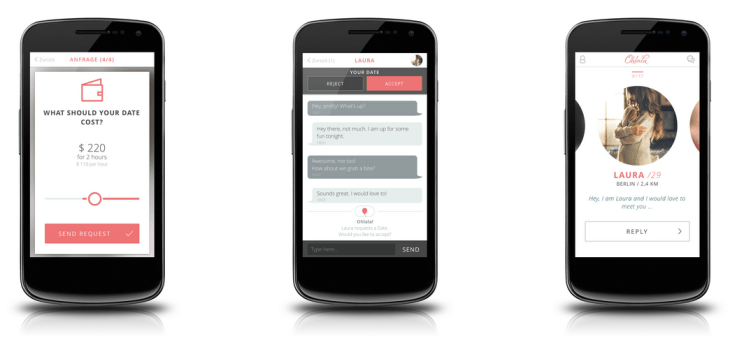Until now, “let’s meet” apps like Tinder have skirted the border between dating and simple sexual hookups. Others, like Grindr, have been far more blatant. But no one (at least to my knowledge!) has tried to create what is in effect an Uber for escorts. Till now.
Last year, Berlin-based entrepreneur Pia Poppenreiter created Peppr, an app that connected clients to sex workers, where the client sent a direct booking request to the sex worker. Amid a storm of publicity, mostly in Germany, Peppr quickly ran into problems with simple mechanics of its model. If there were a couple of hours between sending the request and getting feedback, it was very likely that the request was canceled.
In other words, the booking process didn’t really facilitate “on-demand.” But equally as important, feedback from the escorts was they didn’t want to be labelled, and preferred more control over their profiles. Poppenreiter killed the service and went back to square one, consulting heavily with the women who work in the industry to find out what might actually work: “Because I still believe after all that this market needs be disrupted,” she tells me.
Today she launches the new concept, Ohlala, in Berlin first but with an English language rollout soon. While it’s a responsive mobile web app for now, it will become a native app in the next few weeks, assuming it’s accepted.
Here’s how Ohlala will work. It’s a platform where people connect to meet for their “paid dates” offline. (Paid dates is the language used here). It’s that simple. One person wants to be paid, the other one wants to pay. “Whatever those two people want to do — may it be to give company at a dinner or end up in bed together — is a private matter and should be agreed upon in the chat before meeting,” says Poppenreiter. “It’s simple: We match people for paid dates immediately. It actually solves problems in this marketplace, that dating sites and most escort sites don’t solve: We match expectations, on-demand.”
She says this solves three stumbling blocks: on-demand bookings, privacy (there are no public profiles), and security for both parties.
A key aspect is this is that the old tradition of women being “picked” by men is turned on its head and puts the power back in the hands of the women.
The old escort-booking process worked like this: a guy sends a booking request to a lady and asks if she has time. She most likely won’t reply immediately. He will be frustrated and will cancel. With Ohlala, the women decide who they want to show their profile to.
“Other sites all go for a list model. We instead flip the booking process in order to realise the on-demand aspect,” Poppenreiter says.
On Ohlala, the guy says what he is looking for. He pitches a price per hour, duration, place and personal preferences and sends it to available ladies near by. If they find the request interesting they reply to his booking request and then are then able to chat on the platform. But only if the woman explicitly agrees. Until then, her profile is private.
This is where the distinction with Uber ends, because on Uber the booking platform selects the driver that is nearest and available. In this scenario the women can still refuse to make themselves available whether they are near or not.
In addition, Ohlala plans to verify each profile by having a short phone call in the beginning with the escorts, to ensure they get the “right people” on board. With the men/customers, they won’t verify, but they will manage the sign-ups to balance supply and demand.
Ohlala closed a small seed round in June to finance the launch, but will fundraise again shortly. The investors are Kodama UG (Ben Kubota); Daniela Klenke; Andreas Hoffelder; Ertler Holding (immonet); Grashopper Holding and Dewald Holding.

The team is co-founder/CEO Poppenreiter and co-founder Torsten Stüber (CTO) with a total of seven people. Stüber is a former lecturer at TU Dresden and holds a PhD in machine learning. Poppenreiter is a former investment banker, with a degree in business and a major in business ethics.
Clearly, Poppenreiter is on to something. If Ohlala is successful it could remove the middle-men from the escort business entirely. Obviously the app will be controversial in some quarters, but even mildly successful, it would give the women who choose to join that industry far more options, and power, than they currently have.
